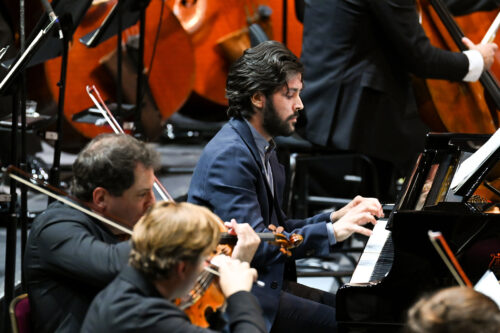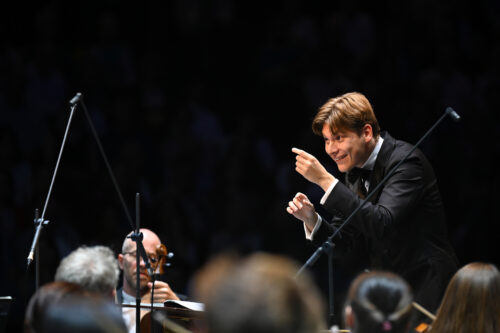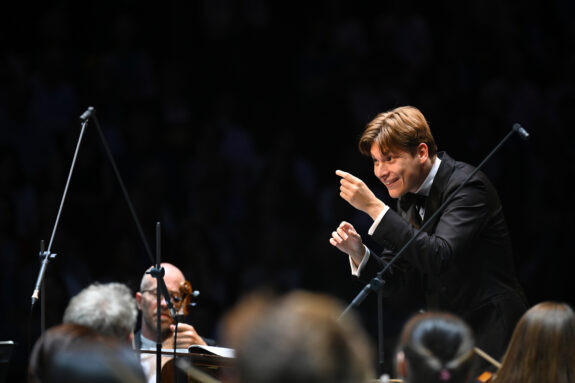
 United Kingdom PROM 58 – Debussy, Stravinsky and Berlioz: Jean-Baptiste Doulcet (piano), Orchestre de Paris / Klaus Mäkelä (conductor). Royal Albert Hall, London. 3.9.2024. (CSa)
United Kingdom PROM 58 – Debussy, Stravinsky and Berlioz: Jean-Baptiste Doulcet (piano), Orchestre de Paris / Klaus Mäkelä (conductor). Royal Albert Hall, London. 3.9.2024. (CSa)

Debussy – Prélude à l’après-midi d’un faun
Stravinsky – Petrushka (1949 version)
Berlioz – Symphonie fantastique
There is always a distinctly international feel to the last few weeks of the BBC Proms Season with visits by orchestras and ensembles from Europe and further afield. Despite post-Brexit travel complications, and the difficulties caused by the current funding crisis in the arts here in the UK, 2024 has been no exception. The orchestras of the West-Eastern Divan, Rotterdam Philharmonic, Czech Philharmonic and Berlin Philharmoniker have already played to packed and wildly enthusiastic houses. This welcome appearance by the Orchestre de Paris, only their tenth visit to the Proms over the last fifty years, was no exception. The programme under their celebrated young Music Director Klaus Mäkelä, was distinctly French in origin and very much part of the band’s core repertoire. Debussy’s delicately impressionistic Prélude à l’après –midi d’un faun and Stravinsky’s Petrushka, the latter specifically commissioned by Sergei Diaghilev for his Paris-based Ballets Russes, made up the first half of the evening, while Berlioz’s dazzling Symphonie fantastique occupied the second half.
It is culturally enriching and positively advantageous to hear visiting orchestras from all over the world. They can bring their own cultural background, musical interpretation, and fresh perspective to a familiar work. This can also help audiences to develop a deeper appreciation of the different techniques, tempos and tonalities which can spring from regional traditions. But does this fine Paris orchestra (or for that matter a fine Dutch, Czech or German orchestra) have a readily recognisable sound of its own? The cognoscenti claim to be able to identify the Czech Philharmonic from the lyricism of its phrasing, or Berliners from the opulence of its string section, or French ensembles such as the Orchestre de Paris through the subtle inflection of their woodwind and the resonance of their brass. Much depends however on the influence of the music director on a specific performance, and the acoustical environment in which it takes place. An orchestra’s characteristic DNA, discernible when playing in in a well-designed concert hall at home, can be lost in an away-day venue with the auditory challenges of the Royal Albert Hall.

This change of venue posed a challenge to the Paris players. The conducting style of the prodigiously talented former cellist 28-year-old Finn, Klaus Mäkelä also presented a further difficulty. Currently Chief Conductor of the Oslo Philharmonic, as well as the Orchestre de Paris, Mäkelä is scheduled to assume the same role at the Royal Concertgebouw and the Chicago Symphony in 2027/8 when his existing contracts expire. He is one of today’s most dynamic conductors, with the physical agility of a Kung-Fu master. But to what end? Whether or not his vigorous and at times distracting direction helped the players realise his interpretive vision of such familiar material seemed unclear. Propelling, or perhaps reacting to forte musical climaxes by the whole orchestra with a mixture of expansive sweeps of the arm, jabs of the finger, high leaps and low crouches, Mäkelä appeared to emanate an almost electric energy, suggestive of a young Leonard Bernstein. Yet in solo or small group instrumental passages when gentle direction might have assisted, he stood entirely motionless. The consequence was that although, overall, the playing was assured and well executed, there were some moments when it was imbalanced, unfocused or difficult to hear.
Anaïs Benoit’s sinuous flute introduction sounded a long way off in the first few bars of a shimmering, beautifully flowing Prélude à l’après-midi d’un faun but grew in volume and lustre when joined by velvety horns, delicate harps and lushly textured strings. The Debussy was followed by angular, precision-tooled performance of Stravinsky’s 1947 revision of his ballet Petrushka. The hard-edged cubist elements of this early masterpiece contrasted starkly with Debussy’s languorous soundworld. In a colourful reading of the score, the musicians recounted the Shrovetide story of the little fairground puppets. Although the performance lacked its customary bite, there was some sparking playing from every section and Petrushka, characterised on the piano and played by Jean-Baptiste Doulcet, a ballerina, (Philippe Dalmasso on the trumpet) and a Moor (seductively evoked by Philippe Berrod’s clarinet) were all outstanding.
Infatuated with his muse, Harriet Smithson, in 1839 Berlioz wrote to a friend: ‘For some time, I have had a descriptive symphony in my brain. When I have released it, I mean to stagger the musical world.’
Over 120 years later, Bernstein in a concert series graphically entitled ‘Berlioz Takes a Trip’ described Hector Berlioz’s Symphonie fantastique as ‘the first musical expedition into psychedelia’, and the Parisians gave this extraordinary composition a thrilling and at times mind-bending reading. The work, which Berlioz entitled ‘Episode from the life of an artist’ is divided into five sections, which include descriptive headings such as Reveries and Passions, March to the Scaffold and Dreams of a Witches’ Sabbath. They were presented here with exceptional clarity of texture. With sonorous strings, piercingly precise woodwind, clarion power from brass and horns, and thundering contributions from timpani, the orchestra, under Mäkelä’s baton, were at once controlled and liberated. There were too, some beguiling offstage contributions. High up in the gallery Gildas Prado’s cor anglais sounded a baleful note in the third section Adagio, entitled Scène aux champs, while the infernal Witches’ Sabbath – replete with devilish skirls of the piccolo – was rendered more chilling by the ominous but invisible striking of funeral bells.
A helpful programme note points out that that the Orchestre de Paris is the only French ensemble to have offered this symphony at a Prom, having done so for the first time almost 24 years ago. Their last visit to the BBC’s festival was in 2018. Judged by the quality of their musicianship and by the tumultuous applause that greeted them on this occasion, one can only hope they will return soon.
Chris Sallon
